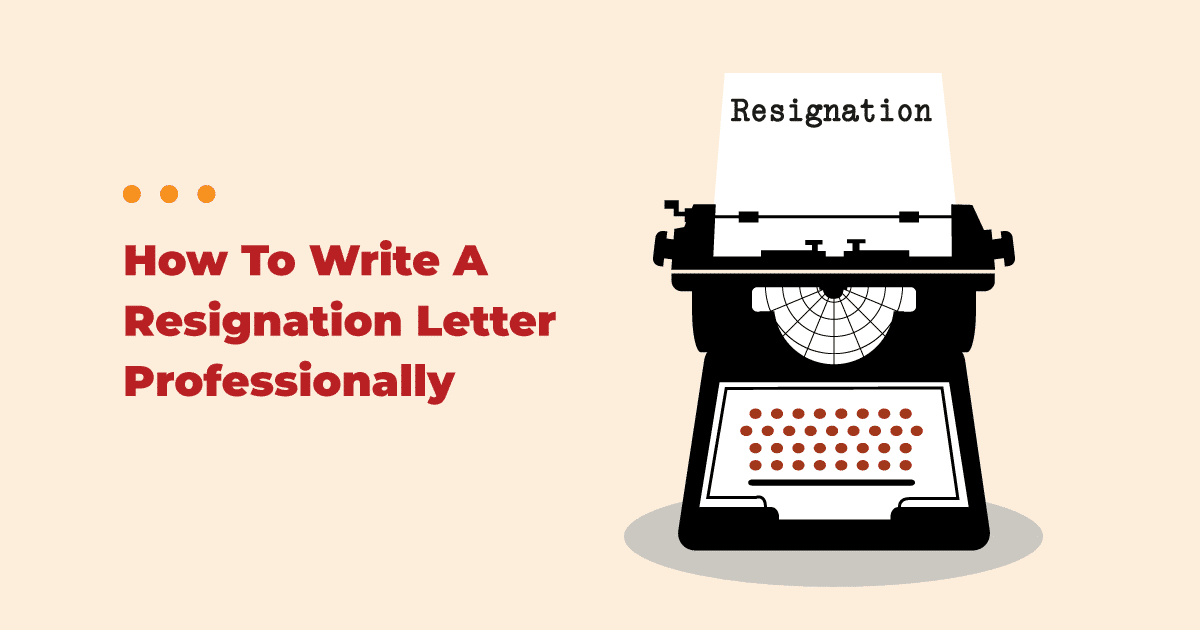Move On The Right Way
In any work situation, there comes a time when you need a change and that may mean a career change or just a new path. The professional way to inform your employer is through a resignation letter.
Resignations are normal in most organisations. As such, don’t feel that when writing your resignation letter, you are committing a crime. Instead, be honest and earnest in your words. Resignation is not an easy step so here are some critical steps to consider and reflect on before you quit your job, to ensure a smooth transition.
Pause and Reflect

Why are you leaving? Is it a fit of anger that will end a wonderful opportunity to grow your career? Is it about a coworker who you cannot stand? In this case, you should think of yourself first, they will be noticed and their exit will come with time. Or maybe it is a toxic situation you feel has no remedy? Always remember, however, most cases have a remedy, even if you don’t know what it is yet. Ideally, if your resignation comes as a result of a new opportunity that means financial as well as professional growth. Reflect on lessons learned at your job and how you will behave in future, how you will use your instincts or keep good records, or whatever your game plan to improve your workplace situation, or to get yourself into your dream job.
- Your Transit Plan

If your resignation is due to a current crisis situation, think hard about where you are going to, what you are going to live on, how you will pay your rent. Do you have a freelance job or a consultancy to cushion your transition? Have you called your trusted friends to find out if there are openings you can get into? It is usually harder to find a job when you are not in one, so do the best you can to find something while in a job. Attend events and network like crazy. Tell people what you do and that you are open to new challenges. Find a recruitment consultant with job openings that might interest you; use online sites such as BrighterMonday to scour for jobs; practice job placement exams in readiness for the interview. Target to send out about 4 applications a day, and make time to do them. It is not about sheer volume of applications but ensuring that they are tailored to the job you are applying for. Save your income carefully for several months as an emergency fund for your exit strategy so that you will have a grace period and resources to seek out another job.
- Get Your Story Straight

Tell no one of your plans before you have formally announced, a friend at work is still a colleague, and may accidentally spill the beans before you are ready. Consider whether you want to tell your ex-employer where you are going. If you have a good relationship, being honest about the reasons you are leaving will maintain the relationship. If you are leaving on frosty terms, rather ‘returning to school to gain your Masters’ or ‘going into the family business’ should be as far as they are concerned. Whatever you choose to say, think it through, stay close to the truth and prepare a few speaking notes just in case there is a formal meeting or conversation about your departure.
Table of Contents
How To Write A Resignation Letter
Follow The Standard Procedure When Handing in A Resignation Letter
Are you planning to give 1-month notice or are you choosing to compensate your employer for the month? Decide your game plan and map it out, this will help you get prepared. Write a brief resignation letter, insert a date, print it and place it somewhere safe in your house. This will get you in the mindset of transition and get you going. Mark it on your calendar and start a countdown. Eg. If you are giving yourself 6 months or 90 days whatever the timelines, plan what activity will happen each month and mark it off on the calendar as it happens, much like a well-planned project. This will keep you motivated and prepare for your transition.The resignation must be formal in the form of a letter and/or an email. Do not resign on a voice call or on social forums like text, Whatsapp, Facebook or other social forums. It is vital that you double-check your contract of employment and make sure that all details of notice period are in compliance with your resignation letter. This is because submitting your resignation and leaving immediately without serving your notice could leave you liable to the notice period being deducted from your terminal benefits, according to the current labour laws. After submitting the resignation letter, you may be required to follow specific procedures for ending your term, including returning assets, handing over to another person within the company. As much as possible, comply and leave your current employer on a positive note.
Keep it Brief and To The Point
Employers are human too. They do need to know the reason for your leaving for their own peace of mind. The simple rule in this is, the less detail, the better for everyone. If it is a new opportunity, just say so “I have found a new opportunity”. However, if the reason for the resignation is negative, it is also advisable to stay brief and stay positive in your reasons for leaving.
Never Vent Your Frustrations in The Resignation Letter
As much as your job might have been hell on earth, restrain yourself from venting out your anger. You may say more than you intended and ruin any sympathy that you may have from well-wishers. Your emotional attachment to issues could again likely lose you valuable support in future.
The Handing Over of The Resignation Letter Matters A Great Deal
Always be mindful of your notice period terms and conditions. The day you present your notice to your immediate boss or the HR Department by hand or on email, you begin serving the notice. How and where you present it doesn’t really matter, it’s just important that you present it and confirm its deposit. You should also get a return confirmation from the employer that they have noted your resignation and how they wish you to serve the notice. The Employer will have the discretion to decide if they do not wish you to serve the notice in the office.
Sample Resignation Letter
| Dear (Your Direct Reports Name & HR Manager), I am hereby handing in my resignation letter effective immediately. I will serve the company until the 20th of December 2016 in accordance with the 30 day notice period as stipulated in my contract. I am resigning because I have found a new opportunity and I am thankful for the time I served the company in my capacity as the Accounting Officer and for the skills and experience gained. Kind regards, James Mkubwa. |
Before You Leave

Ensure that you have you received your letter of recommendation from the company after your resignation. This could play a key role in the future, as it is important to have as many references as possible. Make sure to add your team on LinkedIn or at least get their contact details, they could you valuable contacts for your career in the future
Your resignation should be carefully planned and executed. Do not be in a hurry to leave and leave in bad faith. Make it brief and formal. Ensure that you state, in your resignation letter, the last date of your notice and do not go into details of why you are resigning. Finally, hand it in officially and if you are serving your notice period, give your job the very best and leave on good terms.





